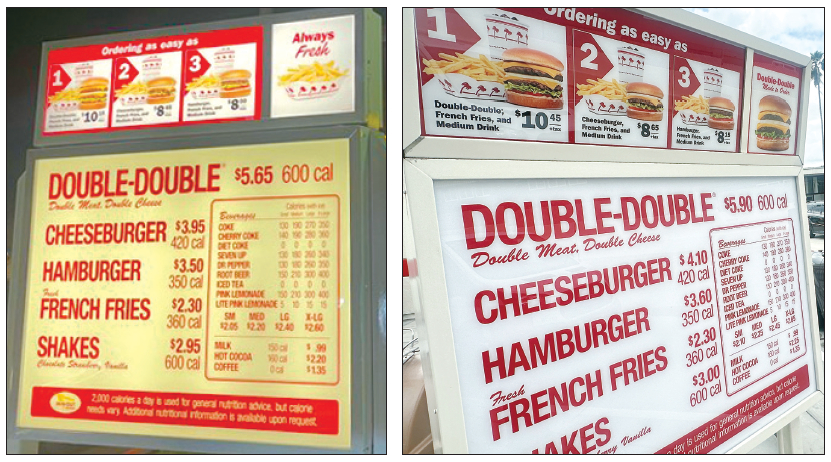Inflation is once again showing signs of acceleration after a slowdown.
Although inflation in the consumer price index has slowed down, food, restaurant, and gas prices are on the rise again.
The rebound in inflation is being driven by higher food prices due to multiple factors such as wage hikes for fast-food employees, higher egg prices, rising gas prices, and the price of cocoa and coffee beans used in cakes and sweets.

Fast food prices are rising
On April 1, the minimum wage law of $20 per hour for fast food workers took effect. In response, many fast-food companies have raised their prices. The increase in fast food prices is expected to lead to an overall increase in restaurant dining prices.
For example, In-N-Out Burger raised the price of burgers and sodas, including the combo menu. The increase was relatively small, with cheeseburgers going from $3.95 to $4.10, hamburgers from $3.50 to $3.60, and double-double burgers from $5.65 to $5.90. French fries ($2.30), milk (99 cents), hot cocoa ($2.20), and coffee ($1.35) remained the same.
Burger King also raised food prices significantly. The Texas Double Whopper combo was $15.09 on March 29 and jumped to $16.89 on April 1, a 12% increase. The Big Fish went from $7.49 to $11.49, a 53% increase. Most other menu items increased by 25 cents to a dollar.
Chipotle plans to increase menu prices at its California locations by 5 to 9 percent. McDonald’s and Jack in the Box have also announced plans to raise prices. Jack in the Box announced a 6-8% price increase this year.
Egg and gas prices soar
The recent outbreak of bird flu and rising gas prices are adding to the burden on consumers.
The largest egg producer in the nation, Cal Main Foods, has suspended production due to the bird flu outbreak in Michigan. The company has culled about 1.97 million chickens due to the outbreak.
The average price of a dozen eggs in March was $3.10, up $0.19, or 6%, year-over-year, according to the USDA’s survey.
Global energy markets have also been jittery, with speculation that international oil prices could spike.
Bank of America (BofA) estimates that Brent and West Texas Intermediate (WTI) crude oil prices could reach $95 per barrel this summer.
Currently, the average price of gas in Los Angeles County is $5.22 per gallon, up about 7% from this time last year.
Cocoa and coffee prices at record highs
The price of cocoa, the main ingredient in chocolate, has also seen a steep increase this year.
Cocoa prices broke through the $10,000 mark for the first time last month and hit a new all-time high ($10,324) on Monday, marking a more than 120% increase so far this year.
Citigroup analyzed that there is potential for further gains to the $11,100 – $12,000 range if demand remains robust. The main reason for the rise in cocoa prices has been bad weather and crop disease in West Africa, which produces 75% of the world’s cocoa, resulting in reduced harvests.
The surge in cocoa prices has boosted sales of other snacks. “Demand for chocolate has shifted to cookies and sweets over the past two months,” said Ken Goldman, senior analyst at JPMorgan, adding that “the surge in chocolate prices will also influence the price of cakes and cocoa drinks.”
Coffee bean prices are also rising steeply. As of April 4, Arabica beans were trading above $2 per pound, marking another record high.
This is due to the ongoing heatwave in Vietnam, which has caused robusta coffee bean production to plummet, shifting demand to Arabica beans and eventually also driving up prices again. With coffee bean prices on the rise, prices of coffee at coffee shops and packaged coffee beverages are expected to rise.
“Eggs are widely used in various foods and baking and confectionery, and the price of cocoa, which is used not only in chocolate but also in cookies and cakes, is also soaring,” said an industry expert. “Food prices are rising across the board, and the increase in gas prices will lead to higher transportation costs, which may eventually lead to a resurgence in inflation.”
In particular, the impact of the fast-food minimum wage could spill over into other industries beyond just food service, which could further drive up prices, he added.
BY EUNYOUNG LEE, HAEUN CHUNG, JAESUN SUH, HOONSIK WOO
[lee.eunyoung6@koreadaily.com, chung.haeun@koreadaily.com, suh.jaesun@koreadaily.com]




